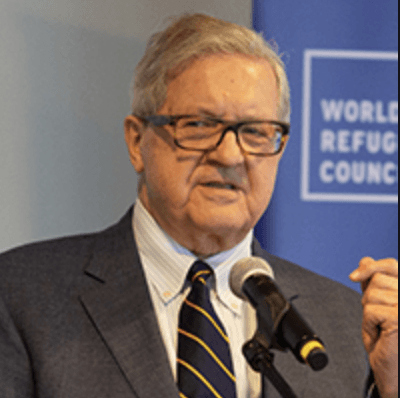By Lloyd Axworthy & Michael W. Manulak
As the war in Gaza drags on and pressure mounts on the U.S. and Israel to enact an extended ceasefire and truce, many have begun to ask what comes next. Israel cannot and should not run Gaza; regional actors, such as Jordan and Egypt, are reluctant to get involved. In the short term, the Palestinian Authority lacks the capability.
We believe that the United Nations must step into the breach. In October, Germany floated the idea of a transitional UN mission – backed by a Security Council mandate, the support of the U.S. and key regional actors, and which involves the Palestinian Authority – that could provide security and basic services to war-ravaged Palestinians expanding greatly on the work of the UN Relief and Works Agency (UNRWA), which, along with other UN agencies, has been a lifeline for Gazans. This proposal, which would have to be authorized under the UN’s Chapter VII mandate, demands serious consideration.
This mission, with its many interests, would not be easy to put together. It would need to reassure Israel that its security would be guaranteed. It must also enjoy legitimacy in the region. Previous missions in Kosovo, Bosnia and Herzegovina, and East Timor could provide possible models.
Given the unpopularity of the United Nations among Israelis, strong U.S. backing for the mission will also be essential. But a prominent American face on the initiative could prove polarizing in New York and elsewhere, however. Yet, the self-interest of Israel to extricate itself from a potential humanitarian quagmire, while also ensuring its security, will necessarily drive diplomacy.
And just as it did during the 1956 Suez crisis, Canada can play a big role in helping others help themselves.
With its long history of friendship with Israel, strong ties to the United States, and links in the region, Canada is well-placed to step into the political space for peacemaking. Prime Minister Justin Trudeau’s government has increasingly positioned itself in the middle ground: staunchly supportive of Israel’s right to defend itself, but critical of Israeli military overreach, voting last week in favour of a non-binding motion in the UN General Assembly calling for an “immediate humanitarian ceasefire.”
Canada can work with other key countries that support a temporary UN administration along with Israel, the U.S., the Palestinian Authority, Jordan, Egypt and the Red Cross/Red Crescent. The head of the Palestinian Authority, Mahmoud Abbas, has in the past asked for a United Nations protectorate for Gaza and the West Bank.
As with any initiative, timing will be critical. The diplomatic legwork must begin now. Foreign Minister Mélanie Joly should visit New York, Washington, and relevant world capitals to garner support. Our diplomatic network needs to be mobilized to promote a UN-based solution.
Canada must also consider the participation of the Canadian Armed Forces in any mission and a diplomatic role in the temporary administration. And to achieve all this, the government needs to build a parliamentary consensus at home.
Why should Canada do this?
The humanitarian crisis in Gaza is dire. The death toll mounts daily, and the Israel Defence Forces are projecting the conflict to carry on for months with continuing civilian casualties. The longer the conflict persists, the greater the risk that it will spread instability across the region. Peacekeeping missions in southern Lebanon and the Golan Heights could be at risk.
A successful mission – and the potential for a longer-term resolution – would also be a tremendous shot in the arm for multilateralism and the United Nations, in a year that has hardly been kind to either. Peace support missions have been shuttered in Mali, for instance, and the Security Council has turned a blind eye to atrocities in other parts of the world, such as the emerging genocide in Sudan. Re-establishing a leading UN role in conflict management and civilian protection would be a success story for the organization, while removing a major source of division in UN politics on questions of vital interest to Canada, including the protection of civilians, climate change, and nuclear non-proliferation. Boosting the UN’s credibility is in Canada’s vital interest; after all, the UN remains a primary avenue by which Canada can protect and promote its global interests.
We need a peaceful solution to what is presently an intractable crisis. Canada has an opportunity to step up its diplomatic efforts to help achieve that noble goal.
This article was first published in the Globe and Mail.
Lloyd Axworthy is the chair of the World Refugee and Migration Council and a former Canadian foreign minister. Michael W. Manulak is assistant professor at the Norman Paterson School of International Affairs at Carleton University, and co-author of the report “Canada and the United Nations: Rethinking and Rebuilding Canada’s Global Role.”
Photo: UN Photo/Eskinder Debebe

